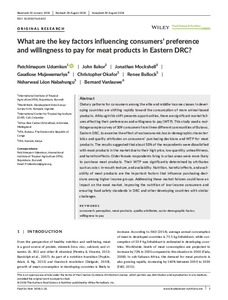What are the key factors influencing consumers? preference and willingness to pay for meat products in Eastern DRC?
Dietary patterns for consumers among the elite and middle?income classes in developing countries are shifting rapidly toward the consumption of more animal?based products. Although this shift presents opportunities, there are significant market failures affecting their preferences and willingness to pay (WTP). This study used a multistage sample survey of 309 consumers from three different communities of Bukavu, Eastern DRC, to examine the effect of socioeconomic/socio?demographic characteristics and quality attributes on consumers? purchasing decisions and WTP for meat products. The results suggested that about 53% of the respondents were dissatisfied with meat products in the market due to their high price, low quantity, unhealthiness, and harmful effects. Older female respondents living in urban areas were more likely to purchase meat products. Their WTP was significantly determined by attributes such as color, in?mouth texture, and availability. Nutrition, harmful effects, and availability of meat products are the important factors that influence purchasing decisions among higher income groups. Addressing these market failures could have an impact on the meat market, improving the nutrition of low?income consumers and ensuring food safety standards in DRC and other developing countries with similar challenges

